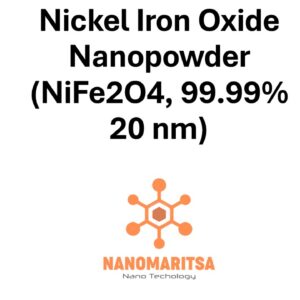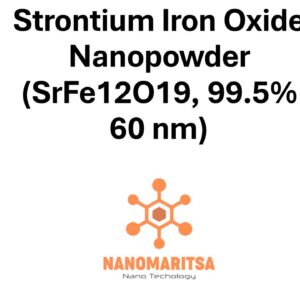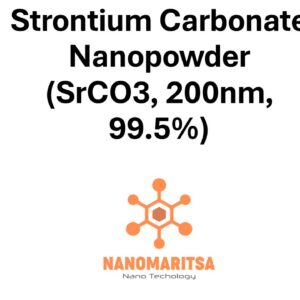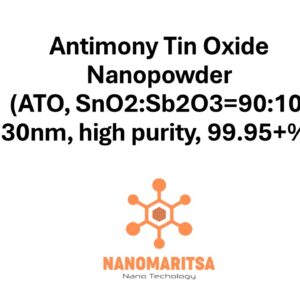Zinc carbonate (ZnCO₃) nanopowder, with a particle size of 20 nanometers and a purity of 99.5%, is an advanced material known for its chemical versatility, thermal stability, and reactivity. Its nanoscale dimensions and high purity make it a valuable component in applications such as catalysis, ceramics, cosmetics, and environmental remediation. This nanopowder’s high surface area and excellent dispersibility enhance its performance in a variety of industrial and scientific applications.
Composition and Structure
ZnCO₃ (Zinc Carbonate):
Zinc carbonate is an inorganic compound that decomposes into zinc oxide (ZnO) and carbon dioxide (CO₂) upon heating. Its nanoscale structure increases its reactivity and makes it highly efficient in catalysis, material synthesis, and environmental applications.
Purity (99.5%):
The 99.5% purity ensures minimal impurities, enhancing its performance in sensitive applications such as pharmaceuticals, cosmetics, and advanced materials.
Particle Size (20 nm):
The ultrafine particle size of 20 nanometers provides a high surface area, which improves reactivity and dispersion in composite systems and catalytic processes.
Properties
Thermal Decomposition to ZnO:
Upon heating, ZnCO₃ decomposes to produce zinc oxide, a widely used material in applications ranging from coatings to energy storage.
High Reactivity:
The nanoscale size and large surface area enhance its reactivity, making it suitable for catalytic applications and chemical synthesis.
Chemical Versatility:
Zinc carbonate reacts with acids to produce zinc salts and with bases to form zinc hydroxide, demonstrating its adaptability in chemical processes.
Non-Toxic and Biocompatible:
ZnCO₃ is non-toxic and biocompatible, making it suitable for applications in pharmaceuticals, cosmetics, and food-related industries.
Applications
Catalysis:
Zinc carbonate nanopowder is widely used as a precursor in the synthesis of catalysts for petrochemical and chemical reactions. Its reactivity enhances catalytic efficiency and reduces processing times.
Ceramics and Advanced Materials:
ZnCO₃ is used in the production of high-performance ceramics, where it improves material properties such as hardness and thermal stability. It also acts as a flux in ceramic glazes.
Cosmetics and Pharmaceuticals:
In the cosmetic industry, ZnCO₃ is utilized as an ingredient in skin care products due to its non-toxic and biocompatible properties. It is also used as a mild astringent and in medicinal applications.
Environmental Remediation:
ZnCO₃ nanopowder is effective in removing heavy metals and pollutants from water and soil. Its high surface area and reactivity allow for efficient pollutant adsorption and neutralization.
Rubber and Polymer Additives:
Zinc carbonate is used as an activator and stabilizer in the production of rubber and polymer composites, enhancing material performance and longevity.
Pigments and Coatings:
ZnCO₃ is employed in pigments and coatings for its role in improving brightness, adhesion, and resistance to weathering.
Recent Advancements and Research Contributions
University of Cambridge, UK:
Researchers are exploring ZnCO₃ nanopowder as a precursor for high-performance zinc oxide nanomaterials used in energy storage and sensing applications.
Tsinghua University, China:
Tsinghua University is investigating the use of ZnCO₃ in environmental applications, particularly in heavy metal adsorption and wastewater treatment.
National University of Singapore (NUS):
NUS scientists are advancing the use of ZnCO₃ in hybrid composites for ceramic and polymer applications.
Massachusetts Institute of Technology (MIT), USA:
MIT is focusing on the role of ZnCO₃ nanopowder in the development of sustainable catalysts and advanced coatings.
Recent Developments
- Nano-Enhanced Catalysis: The use of ZnCO₃ nanopowder in catalytic systems is increasing efficiency and reducing reaction times in industrial processes.
- Hybrid Materials: Combining ZnCO₃ with other nanomaterials is expanding its applications in energy storage and environmental remediation.
- Eco-Friendly Processes: Advances in green synthesis methods are reducing the environmental impact of ZnCO₃ nanopowder production.
Future Prospects
Zinc carbonate nanopowder (ZnCO₃, 20 nm, 99.5%) is poised to play a pivotal role in advancing industries requiring high reactivity, thermal stability, and chemical versatility. As research progresses, ZnCO₃ nanopowder is expected to:
- Enable breakthroughs in catalysis and environmental remediation.
- Enhance the performance of ceramics, coatings, and polymers.
- Drive innovations in cosmetics and pharmaceutical applications.
With its exceptional properties and adaptability, ZnCO₃ nanopowder represents the intersection of material science and industrial innovation, offering sustainable and efficient solutions for next-generation technologies.
| Measurement (gr) | 100 grams, 500 grams, 1000 grams |
|---|






